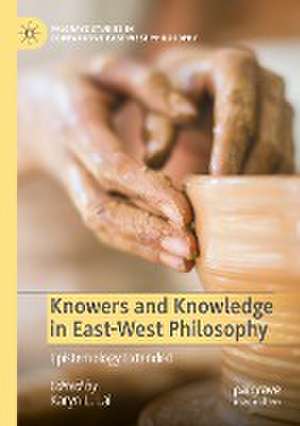Knowers and Knowledge in East-West Philosophy: Epistemology Extended: Palgrave Studies in Comparative East-West Philosophy
Editat de Karyn L. Laien Limba Engleză Paperback – 3 oct 2022
This volume offers arguments from eastern and western philosophical traditions to enrich and diversify our present conceptions of knowledge. The contributors extend contemporary Western epistemology in novel directions, through investigating and questioning entrenched conceptions of knowledge. The cross-tradition engagement with the neurosciences, psychology, and anthropological studies is an important feature of the volume’s methodological approach that helps broaden our epistemological horizons. It presents a collection of perspectives on epistemic agency by engaging philosophical traditions east and west, including Japanese, Buddhist, Confucian, Daoist, and Anglo-analytic.
| Toate formatele și edițiile | Preț | Express |
|---|---|---|
| Paperback (1) | 782.72 lei 43-57 zile | |
| Springer International Publishing – 3 oct 2022 | 782.72 lei 43-57 zile | |
| Hardback (1) | 787.91 lei 43-57 zile | |
| Springer International Publishing – 2 oct 2021 | 787.91 lei 43-57 zile |
Preț: 782.72 lei
Preț vechi: 954.54 lei
-18% Nou
Puncte Express: 1174
Preț estimativ în valută:
149.82€ • 162.79$ • 125.93£
149.82€ • 162.79$ • 125.93£
Carte tipărită la comandă
Livrare economică 21 aprilie-05 mai
Preluare comenzi: 021 569.72.76
Specificații
ISBN-13: 9783030793517
ISBN-10: 3030793516
Pagini: 370
Ilustrații: XV, 370 p. 2 illus.
Dimensiuni: 148 x 210 mm
Greutate: 0.46 kg
Ediția:1st ed. 2022
Editura: Springer International Publishing
Colecția Palgrave Macmillan
Seria Palgrave Studies in Comparative East-West Philosophy
Locul publicării:Cham, Switzerland
ISBN-10: 3030793516
Pagini: 370
Ilustrații: XV, 370 p. 2 illus.
Dimensiuni: 148 x 210 mm
Greutate: 0.46 kg
Ediția:1st ed. 2022
Editura: Springer International Publishing
Colecția Palgrave Macmillan
Seria Palgrave Studies in Comparative East-West Philosophy
Locul publicării:Cham, Switzerland
Cuprins
Chapter 1: Introduction.- Part 1: Knowing better: more capacious knowledge.- Chapter 2: Knowing-to.- Chapter 3: The epistemology of Mengzian extension.- Chapter 4: Knowledge-How attribution in English and Japanese.- Chapter 5: The problem of forgetting.- Chapter 6: Illness Narratives and Epistemic Injustice: Toward Extended Empathic Knowledge.- Chapter 7; The Yin/Yang 陰陽of Pervasive Emotion.- Part II Embodied knowers in epistemic environments.- Chapter 8: Enacting environments: from Umwelts to institutions.- Chapter 9: Extended knowledge overextended?- Chapter 10: The possibility of the extended knower.- Chapter 11: Finding the joy of far-flung friends: extending oneself through terrestrial, metaphysical, and moral geographies.- Chapter 12: State epistemic environmentalism.- Chapter 13: Contextualising and decontextualising knowledge: extended knowledge in Confucius, Mozi and Zhuangzi.- Chapter 14: Models of knowledge in the Zhuangzi: Knowing with chisels and sticks.- Chapter 15: Dreyfus and Zeami on embodied expertise.
Notă biografică
Karyn Lynne Lai is Professor of Philosophy at the University of New South Wales Sydney, Australia. She specializes in comparative Chinese-Western philosophical research and is an editor for Philosophy Compass, associate editor of the Australasian Journal of Philosophy, and Chinese philosophy section co-editor of the Stanford Encyclopedia of Philosophy. Her books include Introduction to Chinese Philosophy (2017) and Learning from Chinese Philosophies (2016).
Textul de pe ultima copertă
This volume offers arguments from eastern and western philosophical traditions to enrich and diversify our present conceptions of knowledge. The contributors extend contemporary Western epistemology in novel directions, through investigating and questioning entrenched conceptions of knowledge. The cross-tradition engagement with the neurosciences, psychology, and anthropological studies is an important feature of the volume’s methodological approach that helps broaden our epistemological horizons. It presents a collection of perspectives on epistemic agency by engaging philosophical traditions east and west, including Japanese, Buddhist, Confucian, Daoist, and Anglo-analytic.
Caracteristici
Expands philosophical discussions on knowledge by engaging with fresh ideas arising from research in the neurosciences, psychology, and anthropological studies Offers a more realistic, phenomenological and concrete understanding of knowledge in human life than has hitherto been provided Presents comparative insights from Japanese, Buddhist, Confucian, Daoist, continental European, and Anglo-analytic thought







